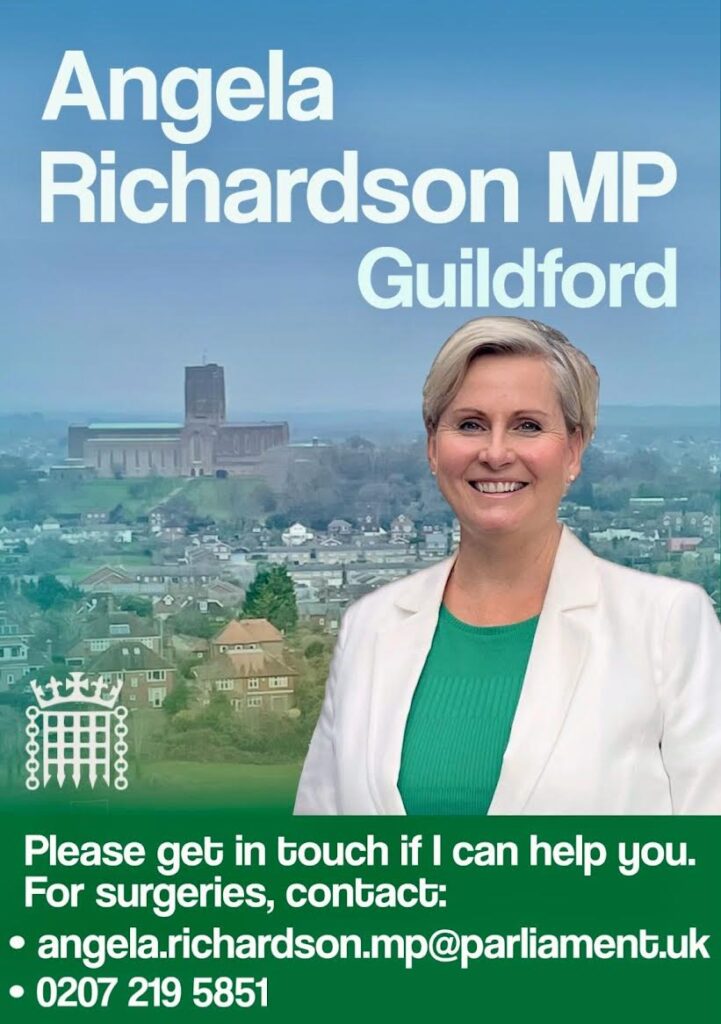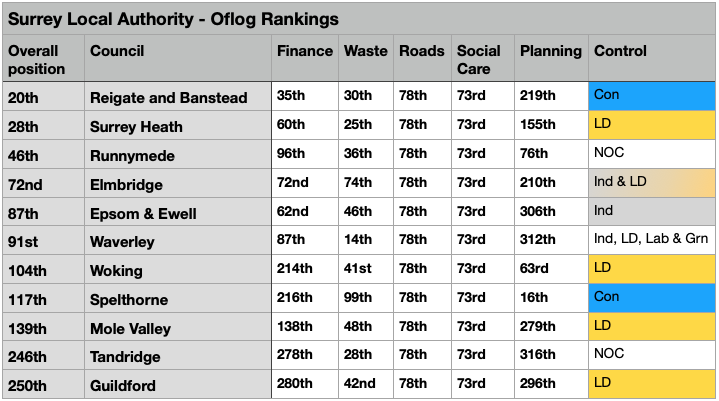 Abraham Lincoln
If given the truth, the people can be depended upon to meet any national crisis...
Abraham Lincoln
If given the truth, the people can be depended upon to meet any national crisis...
 Guildford news...
for Guildford people, brought to you by Guildford reporters - Guildford's own news service
Guildford news...
for Guildford people, brought to you by Guildford reporters - Guildford's own news service
Times Rankings Showing GBC To Be Worst Council in Surrey Dismissed by Lib Dems
Published on: 3 May, 2024
Updated on: 7 May, 2024
By Martin Giles
Guildford Borough Council is the worst local authority in Surrey according to a Times analysis of performance statistics published by the Government.
The analysis, based on data published by a new agency, the Office for Local Government (Oflog), shows Guildford to be among the worst in the whole country for finance and processing planning applications. The rankings are for all 318 local authorities in England.
Ministers set up Oflog last summer to provide “authoritative and accessible” performance data to support improvement in local government. The agency’s figures also show the extent to which councils are struggling with debts, with six local authorities already having declared themselves effectively bankrupt since 2021 including Woking, although it is ranked 214th, 66 places above Guildford at 280th.
Guildford is in a lowly 296th place out of 318 when it comes to planning but Tandridge, Waverley, Epsom & Ewell are ranked even lower.
It’s better news, across the county, when it comes to dealing with waste. All the Surrey authorities are in the top 25 per cent, and Guildford is in 42nd position and 7th out of the 11 Surrey councils.
Scores for roads and social care are the same for all the Surrey authorities and appear linked to the county council’s performance.
 But a spokesperson for Guildford’s Liberal Democrats said that The Times reporting on the Oflog data is “grossly misleading”.
But a spokesperson for Guildford’s Liberal Democrats said that The Times reporting on the Oflog data is “grossly misleading”.
She continued: “Oflog do not provide rankings, they provide statistics, and have actively warned against using them as league tables. Despite this, the Times has taken these statistics and re-organised them into rankings which have misleading descriptions and fail to make like-for-like comparisons.
“Much of the data is highly out of date. For instance, planning performance data from 2020-2022 is used, when Guildford was performing poorly, whereas current data shows a very different picture (over 80 per cent of applications determined within time last financial year, against a government target of 70 per cent).
“Other data is current but doesn’t measure what The Times claims it does, such as with finance, where bankrupt Woking is ranked higher than Guildford because of higher ‘core spending power per dwelling’, even though this is only the result of large council tax rises to cope with their billions of debt.
“Guildford is not a perfect council, and since taking full control last year we have launched major overhauls of our finance and governance structures, but we take pride in having the best recycling rate in Surrey (using most recent figures), in having avoided bankruptcy through identifying £16 million of savings over the past year, and in having turned around our planning department.
“There is still plenty of work to do, which is what our administration is focusing on, but the Times rankings should be considered worse than useless when it comes to measuring Guildford’s true position.”
Guildford Conservative MP Angela Richardson was less critical of the Times rankings and believed they did confirm views that GBC was performing badly.
She said: “It’s disappointing but unsurprising that Guildford Borough Council was ranked by the Office for Local Government as one of the worst-performing councils in the country and the worst local authority in Surrey for finance and processing planning applications.
“Guildford Lib Dems have spent their time in office blaming everyone else for their incompetence, but can no longer hide when measured against neighbouring councils.
“Guildford residents can already see the cost of the Lib Dems in office through dwindling reserves, disappearing public toilets, loss of purple flag and green flag status, no Christmas light switch-ons, parking charge hikes, a fire sale of council-owned properties, and worst of all, invisible political leadership and accountability. Residents deserve better than what they are currently receiving.
“Local people are rightly fed up with constant delays in planning applications and housing cases, not receiving responses to enquiries, as well as service cuts to make up for failings in financial oversight.
“I am working hard to fight the corner of residents with council-related issues, standing up for our High Street by campaigning against further car parking charge increases, which only send visitors elsewhere, and working hard with our Conservative team to oppose decisions which aren’t in the interest of local people.”
The new permanent joint strategic director of finance for Guildford and Waverley Borough Councils, Richard Bates did not quibble with the rankings but explained the countermeasures that have been put in place. He said: “The adverse factors influencing the Oflog ranking for finance are usable reserves and debt.
“As part of the Financial Recovery Plan, we have removed our reliance on usable reserves to balance the budget. We are anticipating an increase in usable reserves at the end of 2023-24. Refreshed data in that respect will therefore show a considerable improvement.
“The debt position remains a concern and was originally forecast to double by 2027-28. We have taken actions to reduce the capital programme by £96m and to reduce debt by £50m from the sale of surplus assets. The completion of the Weyside Urban Village project will generate significant capital receipts in due course. However there will still be a considerable debt burden on the council in the intervening period.”
Pat Oven of the Guildford Greenbelt Group was circumspect: “Without knowing the criteria that Oflog applies to reach its conclusions, or being in a position to assess the efficiency of processes and staff at other councils, it is impossible to make a reasoned assessment of performance of GBC compared with other bodies.
“However the low rankings have to be a cause of concern.
“Whilst others my seek to make political capital out of this, that is not my purpose as leader of GGG.
“GBC has historically always had difficulty in recruiting and retaining staff, especially in finance and planning. That is of course, also likely to be true of other Surrey Boroughs.
“There is reason to believe that stringent cost-saving measures and a carefully assessed policy of selling appropriate borough assets will restore GBC to financial health. This will though, take a number of years. The welcome recent appointment of Richard Bates as Joint Strategic Director of Finance to both GBC and Waverley will I consider, play a significant role in the financial recovery of GBC. He has already overseen a considerable improvement since acting in an interim capacity from last Summer.
“As regards planning application delays, GBC’s performance has increased markedly over the past year, albeit from an admittedly dismally low level. A new Joint Head of Planning has been appointed, Claire Upton-Brown, under whom planning applications have been prioritised. Additional staff have been recruited. The threat of central government intervention has been removed, at least for the present, and currently GBC is performing satisfactorily, so far as I am aware, on timely dealing with planning applications.
“There will of course, always be exceptions to the general trend, but the direction of travel seems favourable at the moment.”
 Responding to analysis by the Times on council performance, Cllr Abi Brown, Chairman of the Local Government Association’s Improvement and Innovation Board, said: “Councils continue to face huge financial challenges, with individual local authorities facing competing demands on budgets that are often unique to their local area and specific circumstances.
Responding to analysis by the Times on council performance, Cllr Abi Brown, Chairman of the Local Government Association’s Improvement and Innovation Board, said: “Councils continue to face huge financial challenges, with individual local authorities facing competing demands on budgets that are often unique to their local area and specific circumstances.
“Differences in spending between councils are natural responses to these differing needs while we also know that variation in spending on certain services is often driven by factors outside the control of councils, such as deprivation and demographics.
“While councils continue to transform services, it is unsustainable to expect them to keep doing more for less in the face of unprecedented cost and demand pressures.
“Our publicly available and accessible LG Inform benchmarking system includes the latest published data to compare each council with other similar authorities and we run programmes in all regions to share best practice, help drive up performance and support councils to make efficiency savings against the challenging financial backdrop they face.”

See Dragon story: GBC’s Explanation of Major Land Sale Notice Error ‘Borders on Arrogant’ Says Councillor




Recent Articles
- What More Does the Solace Report Tell Us About the Housing Revenue Account Investigation?
- Guildford Has a New Mayor
- Notice: Exhibition – Ripley – World Famous Cycling Mecca
- Volunteer Organisers for the Poppy Appeal Urgently Needed
- ‘Damning’ Report Debated at Council Meeting – CEO Calls for Councillors to Come Together
- Surrey Children’s Services Improvement Recognised by Ofsted
- Independent Guildford Stationers Are ‘Top of the Shops’
- Birdwatcher’s Diary No.304
- Cyclist Dies in Peaslake
- Surviving Strategic Director Quits to Take Up CEO Role with a West Sussex Council


Search in Site
Media Gallery
Dragon Interview: Local Artist Leaves Her Mark At One of England’s Most Historic Buildings
January 21, 2023 / No Comment / Read MoreDragon Interview: Lib Dem Planning Chair: ‘Current Policy Doesn’t Work for Local People’
January 19, 2023 / No Comment / Read MoreA3 Tunnel in Guildford ‘Necessary’ for New Homes, Says Guildford’s MP
January 10, 2023 / No Comment / Read More‘Madness’ for London Road Scheme to Go Ahead Against ‘Huge Opposition’, Says SCC Leader
January 6, 2023 / No Comment / Read MoreCouncillor’s Son Starts Campaign for More Consultation on North Street Plan
December 30, 2022 / No Comment / Read MoreCounty Council Climbs Down Over London Road Works – Further ‘Engagement’ Period Announced
December 14, 2022 / No Comment / Read MoreDragon Interview: GBC Reaction to the Government’s Expected Decision to Relax Housing Targets
December 7, 2022 / No Comment / Read MoreHow Can Our Town Centre Businesses Recover? Watch the Shop Front Debate
May 18, 2020 / No Comment / Read More










Recent Comments